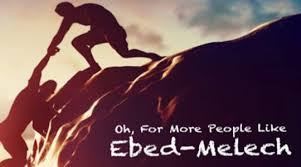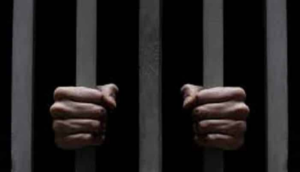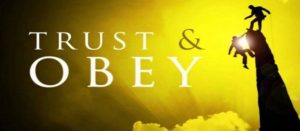TODAY’S READING FROM THE OLD TESTAMENT- JEREMIAH 39:1-41:18
Today’s reading covers the fall of Jerusalem to the Babylonians and the aftermath.
Zedekiah, the son of Josiah, came to the throne after his two older brothers, Jehoahaz and Jehoiakim, and his nephew Jehoiachin. Zedekiah’s original name was Mattaniah. (You can review the chart, noting their numbered sequence).
Nebuchadnezzar deported Jehoiachin to Babylon, and made Mattaniah king instead, changing his name to Zedekiah. He ruled 11 years from 597 to 586 B.C.
We learn that the siege against Jerusalem lasted approximately two years, from the ninth year of Zedekiah to the eleventh year (January 15, 588-July 18, 586 B.C.). The city endured horrible deprivation. A breach in the city wall was made on the eleventh year, fourth month and ninth day. King Zedekiah and some of his army fled, but the Chaldeans caught up with them on the plains of Jericho. Zedekiah was brought to Nebuchadnezzar at Riblah, in Syria, 65 miles north of Damascus (and 200 miles north of Jerusalem). There, the king of Babylon slaughtered the sons of Zedekiah and the nobles of Judah before Zedekiah’s eyes and then Nebuchadnezzar put Zedekiah’s eyes out, taking him as a prisoner in chains to Babylon (Jeremiah 39:7). This fulfilled the prophecy of Ezekiel 12:13:
Ezekiel 12:13 13 “I will also spread My net over him, and he will be caught in My snare. And I will bring him to Babylon in the land of the Chaldeans; yet he will not see it, though he will die there.
The Chaldeans burned the palace and the houses, and broke down the walls of Jerusalem. Nebuzaradan, the captain of the guard, carried the Judeans into their years of exile in Babylon, leaving behind only a remnant of poor people for whom was provided permission to cultivate vineyards and fields to sustain themselves.
God sent word through Jeremiah to Ebed-Melech, the Cushite who had previously intervened on Jeremiah’s behalf, that he would be delivered from harm as the Babylonians attacked “because you have put your trust in Me” (39:18). (This is the first account of an Ethiopian eunuch recorded in the Bible! We read of the conversion of another Ethiopian eunuch in The Book of Acts 8:25-40)
Jeremiah’s reputation preceded him. Nebuchadnezzar gave express orders to preserve the life of the prophet Jeremiah. They found him mistakenly being taken captive to Babylon. Nebuzaradan released him and gave Jeremiah the option of going to Babylon or to go wherever he pleased, even being offered an allowance of food and a royal gift (40:5).
Jeremiah decided to stay in Jerusalem where Gedeliah, the son of Ahikam, had been appointed as governor.
Ten assassins in the service of the Ammonite king Baalis, and headed up by Ishmael, the son of Nethaneah, rise up and kill Gedaliah (Jeremiah 41:2). Former soldiers of Gedaliah had warned Gedaliah of the plot to have him assassinated, but Gedaliah chose not to believe them (Jeremiah 40:13-16).
Ishmael and his men fill a large cistern with the bodies of the men that they killed along with Gedaliah. We are told that it was the cistern that King Asa had built for his defense against King Baasha of Israel. Later, Ishmael takes hostage the king’s daughters and those who were left behind in Mizpah, probably pilgrims who had come to Jerusalem for the Feast of Tabernacles.
When Johanan, the son of Kareah, heard of these evil deeds, he attempts to kill Ishmael and his men. He rescues the hostages (41:13), kills two of Ishmael’s men, but Ishmael escapes and flees to the Ammonites.
TODAY’S READING FROM THE NEW TESTAMENT – 2 TIMOTHY 1:1-18
As far as we know, this Epistle, Paul’s second letter to Timothy, is his last written correspondence. Paul is experiencing his final imprisonment and he knows that he will die soon. He senses that the time of his ‘departure’ is at hand. (2 Tim 4:6). His previous imprisonment was much more bearable. In his former imprisonment in Rome, he received visitors while under house arrest (Acts 28:16,23, 30) and continued to teach. Now he was chained in a cold, dark, miserable prison.
The Roman Emperor Nero had begun his relentless persecution of Christians. In 64 AD Nero was passing the blame for the great fire of Rome from himself to the Christians. A fierce persecution of Christians spread throughout the Empire and included social ostracism, beatings, and horrific torture. Paul was about to be beheaded. He writes what was to be his final letter to his son in the faith, Timothy.
Paul encourages Timothy to come and visit him before he is executed. He remembers Timothy’s sincere faith and encourages him to stand strong. For God has not given us a spirit of fear, but of power and self-discipline.
Timothy should not shy away from proclaiming Christ. He should not be ashamed of the gospel, nor be ashamed of Paul, the Lord’s prisoner. The gospel did what nothing else could do: saved us and called us to a holy calling (2 Tim 1:9), abolishing death and bringing life and immortality to light. The gospel takes the guesswork out of how a person can be right with God and have confidence that believers can stand clean before the Lord on the Great Day of His coming.
He encourages Timothy to keep on keeping on:
2 Timothy 1:13-14 13 Retain the standard of sound words which you have heard from me, in the faith and love which are in Christ Jesus. 14 Guard, through the Holy Spirit who dwells in us, the treasure which has been entrusted to you.
Paul gives Timothy an update on how many have turned away from him, but cites Onesiphorus, as a refreshing exception. Without fear of repercussions, Onesiphorus went out of his way, coming from Ephesus, where Timothy was pastoring, to Rome, boldly seeking Paul’s whereabouts so he can visit him often in jail.
What a precious reminder of the value of prison ministry.
TODAY’S READING FROM THE BOOK OF PSALMS – PSALM 90:1-91:16
Warren Wiersbe writes this about Psalm 90:
“This is the oldest psalm in The Psalms, and it was written by Moses, the man of God. It deals with themes that began with the fall of our first parents and will continue to be important and puzzling until the return of our Savior: the eternal God and frail humans, a holy God and sinful man, life and death, and the meaning of life in a confused and difficult world.”
Psalm 90 begins the fourth book of Psalms and contains songs of the wilderness. This Psalm most likely was written after the children of Israel rejected the report of Joshua and Caleb at Kadesh Barnea, opting to believe the majority report of unbelief about the Land God had promised them. The result would be – years in the wilderness sand instead of the promised land! A whole generation would perish in the wilderness, experiencing God’s holy chastisement.
Moses wants to dignify the trials of their wilderness wanderings and learn their lessons.
Psalm 90:11-12 11 Who understands the power of Your anger and Your fury, according to the fear that is due You? 12 So teach us to number our days, that we may present to You a heart of wisdom.
Psalm 90:15-16 15 Make us glad according to the days You have afflicted us, and the years we have seen evil. 16 Let Your work appear to Your servants and Your majesty to their children.
Psalm 91 reminds us that we can have confidence through all kinds of challenges, dangers, and hardships, if we put our trust in the Lord.
We have a true refuge of genuine fellowship with the Lord as we say to Him, “You are my refuge and my fortress, my God in whom I trust.”
You may remember that Satan quoted to Jesus verses 11 and 12 of this Psalm out of their proper context when he was tempting him in the wilderness to step out of his disposition of trust in God the Father. He wanted Jesus to authenticate that He was the Messiah by putting himself in a situation where he would have to be rescued by angels to survive (Matthew 4:5-7).
Satan was twisting the meaning of Scripture, using God’s Word to manipulate God’s servant. Submit to God, not a Bible-quoting devil! The true meaning is that there is safety if we are trusting and obeying the revealed will of God. Jesus was not on earth to force the Father’s hand, but to do the Father’s will.
This Psalm challenges us with these questions: Are you abiding in Him? Are you trusting Him? Do you call on Him in faith? Have you made Him your dwelling place? Your refuge? Do you truly recognize His Name (His self-revelation in the Word of God)?
TODAY’S READING FROM THE BOOK OF PROVERBS – PROVERBS 26:1-2
Proverbs 26:1-2 1 Like snow in summer and like rain in harvest, so honor is not fitting for a fool. 2 Like a sparrow in its flitting, like a swallow in its flying, so a curse without cause does not alight.
Let’s honor what is truly honorable and disregard any ‘curse without cause’.
PRAY FOR THE NATIONS
Senegal (from “Operation World Prayer Guide” p. 730-733)
Evangelical believers are few. Their growth rate is slow. Pray that the church will take hold of its identity in Christ and powerfully demonstrate its outworking to the nation.
Dakar, the capital, is the most strategic location for evangelizing the entire country. It hosts over 25% of the nation’s population as well as representatives of every ethnic group. From 15 evangelical groups meeting in 1990, there are over 60 today. But while Dakar itself is blessed with many congregations, the outlying areas have only a few small churches- for the nearly three million dwelling there. Dakar is the mission base for most agencies, but only a few missionaries are actually committed to church planting there. Pray for this city to become a source of gospel light to the whole country.
Young people. Of Senegal’s population, 55% are under the age of 20. Many of these are children in crisis; ministry among them is growing- drop-in centers, vocational training and others. The younger generation, often less committed to formal religion, are thereby more open to the gospel. An increasing number of ministries are focusing on reaching young people.
PRAYER: Father, thank You for taking the guesswork out of how guilty sinners can be made right with You and stand clean before You on the Day of Your coming! Through the work of Your Son, You have accomplished what we could not do for ourselves. You have provided a perfect solution to the problem of our dilemma. You have rescued us from ourselves! Truly You are our refuge and the One in Whom we trust! Help us to live in such a way, through the power of Your Holy Spirit, that all we do and say brings honor to You, the One to Whom it is due! In Jesus’ Name. Amen.
Pastor David
